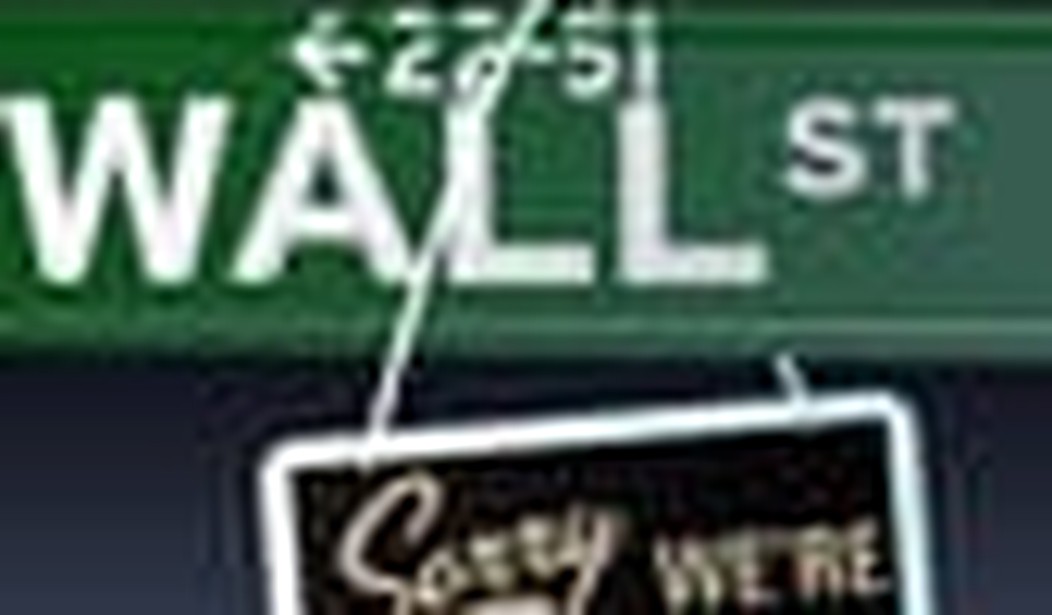Almost everyone who believes in the Constitution and free markets properly considers October 3, 2008, one of the darkest days in U.S. history. It was on that day that the “Emergency Economic Stabilization Act” creating the Troubled Asset Relief Program (TARP) became law. A day later, I wrote that law’s passage, accompanied by tactics and threats which amounted to orchestrated blackmail, over the strident objections of over 150 economists from across the political spectrum, only days after its initial voter-driven failure, proved that Washington’s politicians and elites “don’t care what we think.”
Abhorrent as it was, the sickening saga of TARP’s enactment was nothing compared to what transpired less than two weeks later.
Everyone’s understanding of the legislation — at least publicly expressed — was that it would, quoting from the bill’s text, authorize the Treasury Department “to purchase, and to make and fund commitments to purchase, troubled assets.” Specifically identified “troubled assets” included:
(A) residential or commercial mortgages and any securities, obligations, or other instruments that are based on or related to such mortgages, that in each case was originated or issued on or before March 14, 2008, the purchase of which the Secretary determines promotes financial market stability;
With that congressional authorization, everyone — again, at least publicly — expected Treasury Secretary Henry Paulson to begin buying up “toxic assets.” No one expected that this would be easy, or that settling accounts with affected banks involved would occur quickly.
Ah, but there was a catch in the law which immediately followed. It authorized the purchase of:
(B) any other financial instrument that the Secretary, after consultation with the Chairman of the Board of Governors of the Federal Reserve System, determines the purchase of which is necessary to promote financial market stability, but only upon transmittal of such determination, in writing, to the appropriate committees of Congress.
On October 14, Paulson, with President George W. Bush’s shameful capitalism-betraying acquiescence, morphed the program into a hostile government takeover of the banking system. If there’s one thing the ignoramuses in the Occupy Wall Street crowd and the American people in general need to understand, it’s this: Hank Paulson didn’t ask.
Instead, as the New York Times reported, Treasury’s Godfather called big bank executives into a meeting with no pre-announced agenda, made them an offer they couldn’t refuse, and created the unmistakable impression that every one else below them in the pecking order would have to fall in line:
The chief executives of the nine largest banks in the United States … were each handed a one-page document that said they agreed to sell shares to the government. … Treasury Secretary Henry M. Paulson Jr. said they must sign it before they left.
… [T]he bankers … felt they had little choice but to go along with the Treasury plan to inject $250 billion of capital into thousands of banks — starting with theirs.
In a chilling exchange on CNBC that day delivered with a smirking, casual arrogance which has to be seen to be believed (still available for your viewing horror), Dylan Ratigan and Charles Gasparino described how it went down. Anyone who somehow believes that the banks had a choice should focus on the bolded text:
Ratigan: … [M]any of the banks didn’t want to be tainted with the government bailout funds because they didn’t want to be mistaken for a fool when they actually felt that they were the smart one that didn’t do it.
Well Hank Paulson said: “The heck with that.” He stuck all of them with some of the bailout money. And he said: “Listen, we’re going to reset the clock here and move forward.” Charlie, how are the banks that felt they basically didn’t commit the crime, as it were, of excess or reckless risk, uh, respond to the fact that even they will be stuck with this capital?
Gasparino: Well, y’know, they were all kind of stupid to some extent …..
….. the Treasury Secretary Hank Paulson put all these egos in the room, and basically put guns to their heads, forcing them to take the money to bolster the banking system.
Some of the firms say they didn’t want the cash, but it’s pretty clear that all of them did need to take the cash, given the continued upheaval in the banking system that crushed shares last week of Morgan as well as Goldman Sachs and just about everybody else.
So this is essentially, uh, Dylan, a case where, y’know, you can deny you have any problems. Even the best-capitalized banks have problems. They own this stuff. And Paulson at one point said, “Listen, if you don’t want it, it doesn’t matter, gun to your head, you gotta take it.”
The “gun to the head” was obvious: “You really have a nice bank there. But if you walk out without signing this document, right here, right now, we will bring all of the regulatory and law-enforcement powers of the United States government to bear on your institution. Your depositors and shareholders will suffer immensely. Your bank won’t survive. It would really be a shame if that were to happen. But we promise you, it will.”
Hank Paulson’s defenders will probably claim that provision (B) above gave him authorization to do what he did, and that the preferred shares the banks were forced to issue count as “financial instruments.” The problem with that “logic” is that these weren’t “purchases.” They were extorted ownership interests — and in case you’re wondering, there is no authorization to extort anywhere in the legislation.
The economy as we knew it died that day — and virtually no one objected. As Michelle Malkin wrote: “If you don’t feel like throwing up today, you’re not paying attention.”
That the establishment media had no problem with Paulson’s “purchases” is no surprise. The Associated Press almost admiringly described the meeting as “remarkable.” Democratic presidential candidate Barack Obama, along with many Democrats and far-leftists (a virtually redundant term), likely and quite privately thought they had died and gone to heaven with the sudden progress just achieved towards completing the fifth plank of the Communist Manifesto — on a Republican president’s watch.
So where was Republican presidential candidate John McCain, who only weeks earlier had infamously and suicidally suspended his presidential run to help pass the TARP we didn’t get? Was there some kind of gag rule against saying anything harsh during the final weeks of the campaign? Where were GOP Senate Leader Mitch McConnell and House Minority Leader John Boehner when the reputation-damaging bailout program they pushed through to passage was unilaterally altered by fiat? Their near if not total silence, and that of so many others, was deafening — and sickening.
Hank Paulson’s bloodless banking coup demonstrated that a nearly all-powerful government which believes it is untouchable can and will do anything once it gins up enough of a crisis atmosphere. Paulson’s putsch gave cover to the long list of heavy-handed actions which have followed during the Obama administration, from arbitrarily changing the pecking order in bankruptcy, to preventing nonunion manufacturing plants from opening, to defying direct court orders, to Dodd-Frank’s attempt to permanently keep the government in banks’ boardrooms — and much, much more.
Even beyond what we can see with regulations gone wild, failed stimulus, and outright corruption, our government’s authoritarian overhang and its destructive psychological effect on business and investor behavior largely explain why the economy won’t acceptably grow. Meaningful, generalized prosperity won’t return until we permanently shame and where possible prosecute those involved, and cast each and every one of them from the powerful perches they currently occupy.









Join the conversation as a VIP Member